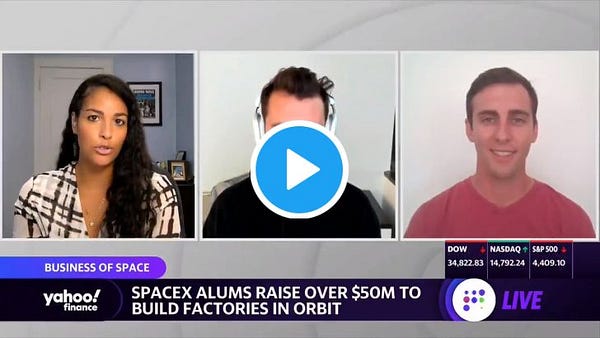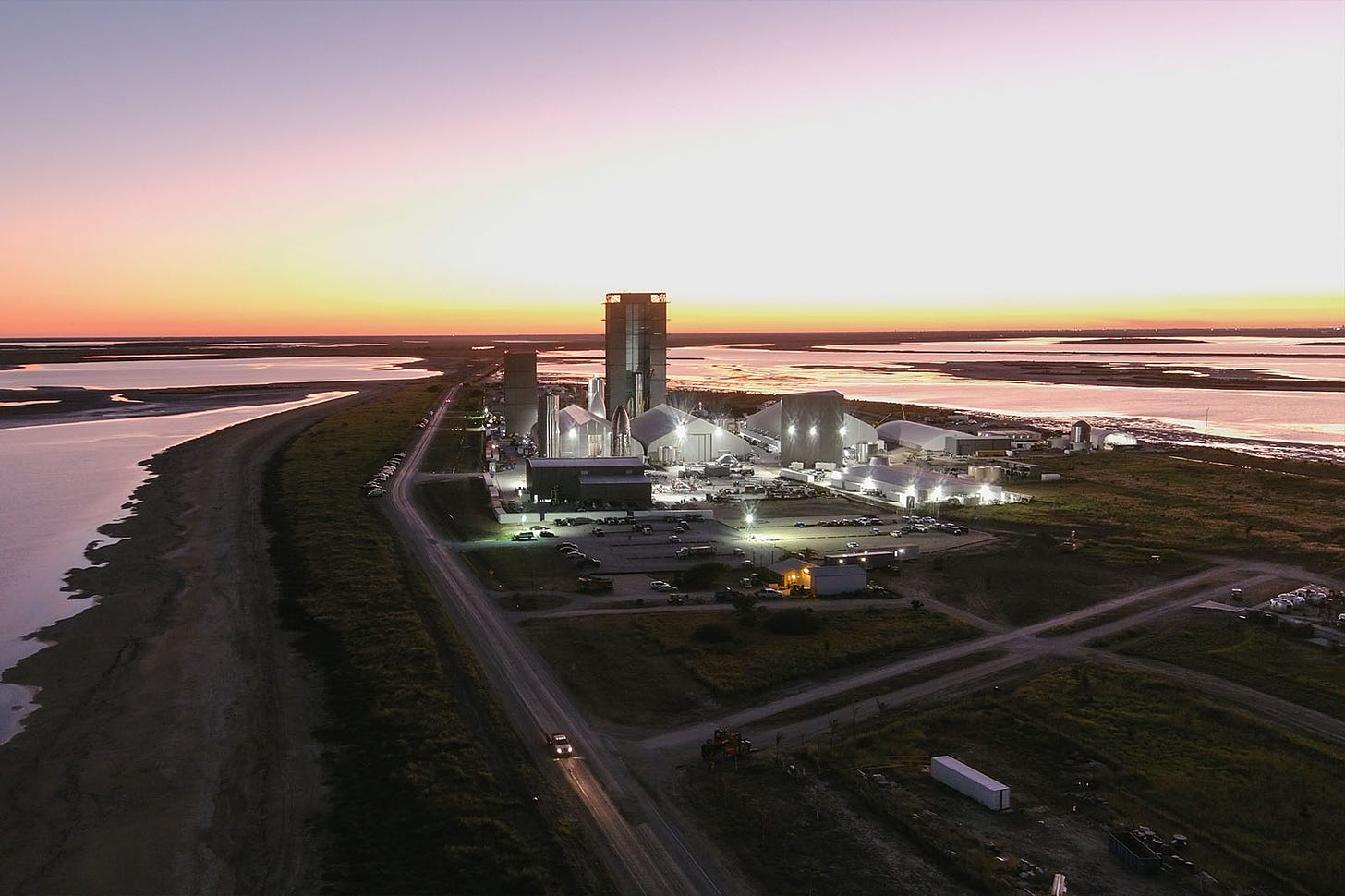Space
It’s been over 50 years since the Apollo 11 mission that put Neil Armstrong and Buzz Aldrin on the moon. Especially in space, progress is not guaranteed. The path to becoming a space-faring civilization requires consistent progress in science and technology. It requires reusable rockets, bigger rockets, rapidly decreasing launch costs, and the list of technical challenges goes on. It's arguably the hardest mission humankind can take on, and that's without resistance from @therewillbeted, Bernie Sanders, and the anti-spacers.



One of the reasons rocket science is so interesting is historically it’s been something that’s brought all of us together. Hearing people collectively cheer — like when Livin On A Prayer comes on at a Bon Jovi concert, or when Tiger Woods tapped in to win the Masters in 2019, or when every American huddled around their television screen to watch the Apollo 11 mission to see if America could put a man on Earth’s Moon — these are things that make us feel excited to be alive. Unfortunately, today, going to space is political, and those dreaming up a future where we are exploring our solar system face an uphill political battle alongside the technical ones. I don’t think it’s wrong to be asking why, but it’s wrong to oversimplify the why for space to be simply about space travel or one man’s ego.
Why are we here?
Is it a simulation? Where are the aliens? People have been looking at the sky asking these questions since we started asking questions. In many ways, the ‘why of space’ is all about asking questions, and as we explore what’s among the stars, we sapiens get a better sense of what questions we oughta be asking. Robert Zubrin, in The Case for Space, makes the argument that we are at the dawn of a new age, whereas our civilization has unlocked the next set of questions.
Many years ago, the Russian space visionary Nikolai Kardashev outlined a schema for classifying civilizations. According to Kardashev, a Type I civilization was one that had achieved full mastery of all the resources of its planet. A Type II civilization was one that had mastered its solar system, while a Type III civilization would be one that had control of the full potential of its galaxy. All of human history up to this point—from the trek out of our African Birthplace to the settling of the continents and then the linking together of the disparate branches of humanity through first long-distance sailing ships, then telegraphs, telephones, radio, television, satellites, and the internet—has been a process of our rise from a local Kenyan biological curiosity to a full fledged Type I civilization. That transition is now nearly complete, and we stand at the beginning of a new history—our rise to become a Type II civilization capable of measuring itself against the further challenge of becoming a Type III civilization.
The progression from long-distance sailing to radios then televisions, to the internet, and so on has brought us to the most recent page, today. Right now we are standing on the new frontier, our brief period of shared experience in history, transitioning to a Type II civilization and becoming a space-faring civilization. Insane. The reason we are on this new frontier, asking whether we should pursue space or not, is because of all the people who believed in science, discovery, and exploration; especially when it wasn’t in style. Heroes. Thankfully, science is less about politics and more about collectively agreed-upon human knowledge, facts. All the great scientists that got us to this new frontier, like Rosalind Franklin, Stephen Hawking, and Nikola Tesla, did so not just by asking why, but by asking how. The how is what makes it possible for me to write to you on your phone. The how makes it possible to vaccinate the world against deadly diseases. The how makes it possible to fly to London, order the TV, fix a torn ACL, access clean drinking water, turn the lights on, and keeps you fed. Science, not politics, is what makes tangible change.
Space and science are a bit of a catch 22; without science, we can’t get to space and without space, we lose the ability to do science. If science, like space, is all about asking questions, and space is the biggest question we have, it would be unscientific to avoid space. If we can’t just hope and will becoming a spacefaring civilization into reality, how do we make it happen? Being amongst the stars rests on logistics, economics, and technological progress.
Prosperity on earth and the economies of space
For many, the argument against space is about resources. Shouldn’t our resources go toward making Earth a better place? Proponents of this argument may follow up with a solution to ‘tax the rich’ and deploy that fiat to ‘shit that matters’. Mike Solona, the author of Pirate Wires, wrote a terrific essay Trillion Dollar Paint Job arguing the last thing the government needs is more money to spend. In short, Trillion Dollar Paint Job illustrates the differences in outcomes when private allocates capital vs. public government allocates capital. This is what matters in the conversation about ‘spending resources’. This phenomenon repeats itself over and over, a tale as old as time.




It’s still plausible someone would argue against space exploration, but would simultaneously agree that resource allocation shouldn’t be up to the government. Why wouldn’t entrepreneurs and scientists allocate the resources to excess carbon capture, or sustainable energy production, or cleaning up the oceans?
Different strokes for different folks. Boyan Slat, for example, is a scientist and engineer who is working night and day to realize his organization's mission to clean up the oceans. Elon Musk, for example, is a scientist and engineer working day and night to realize his company's vision of ‘accelerating the world’s transition to sustainable energy’1 and to ‘make life multi-planetary, and to make humans a space-faring civilization’2. Both of these objectives seem to be noble and useful, but to be honest; it wouldn’t matter much if I weren't passionate about cleaning up the oceans or going to mars, because they are. The Ocean Cleanup and SpaceX are completely different organizations, both with investors of some sort, stakeholders monitoring their progress, allocating their resources to realize their own mission. Thankfully, if @therewillbeted doesn’t like SpaceX’s mission, he can create his own!
Today’s most advanced rocket companies like Rocket Lab and SpaceX are opening the gateway to space. Even after we discovered how to strap a big engine to a rocket and land a rover on Earth’s Moon, fundamentally, we were at a roadblock. Launch costs were astronomical. A commonly used analogy would be building a commercial Boeing jet, for hundreds of millions of dollars, only to use it once. It’s hard to imagine how much any flight, commercial or freight, would cost, and further would make any flight solution a non-starter relative to rail or boat. Since we’ve discovered, explored, and adopted reusable flight it has unleashed the wrath of benefits.
The initial mission for launch companies like Rocket Lab and SpaceX is similar to that of the Wright brothers and flight. In 2001, when Elon Musk flew to Russia to buy three ICBMs3, he was on mission impossible trying to get into rocket launch. Up until this point, rockets were a government affair, and of course expensive. Elon, inspired by the book hitchhiker's guide to the galaxy, insisted rockets needed to become rapidly reusable to make any small chance of true space exploration. Even in the face of criticism from his childhood heroes, like Buzz Aldrin himself, he pressed forward. Fast forward about 15 years and SpaceX landed its Falcon 9 rocket in one of the most exciting moments in modern science.
Reusability is a core component of the space equation, but making rockets bigger, and increasing payload to orbit is the next step. To continue with SpaceX’s journey, they are going down the roadmap building Starship, the successor to Falcon 1, Falcon 9, and Falcon Heavy. Starship is the biggest rocket on the planet, and it’s not even close4. This will increase the number of companies, countries, and organizations that will be able to send their cargo to orbit. Further, now that more companies are building reusable rockets, there are also more launch providers driving down the price to launch.
Satellites are one of today’s most practical beneficiaries from this evolution in lower launch costs. Low orbit satellites are providing low latency connections around the globe and at insanely low costs. In layman’s terms, better internet, coverage everywhere on earth (even the middle of a rainforest), at a lower cost. This is important for all of us, but especially for stakeholders in developing countries where internet connectivity infrastructure lags and for first responders in remote areas like firefighters in the northern California Hills.
The list of beneficiaries from exponentially lower launch costs goes on, but my last example is the spawn of companies doing things in space outside of launch, like Varda and their mission to realize space factories. There are many benefits to manufacturing things in space, even though it’s a pain in the ass to get there. The international space station, which is set up as a research institution, not a factory, has already had success fabricating materials like medicines, chips, sensors, and more. Better unit economics from rocket reusability is creating a big ole space economy. Pie growing.
An ethos for space in the name of human exploration
For the average person, space is about ethos. The economies of space are foundational to exploring our solar system, but bringing the why and the how together are our only shot at success.
Starbase, in Boca Chica, Texas, is where SpaceX is ramping up the production capacity for Starship. Increasing the number of launches per year is a multi-pronged issue of regulation, having more rockets built and ready, and increasing the turnover speed for previously flown rockets. No speed is fast enough, and the urgency for SpaceX employees working to build these massive new rockets in the Texas heat relies on a strong ethos to work round the clock. At Starbase, they call it the gateway to Mars.
That ethos at Starbase, being the gateway to Mars, can be different for different people, that’s one of the beautiful things about life. For some, it’s a more of a stark ethos, where space exploration is about making life multi-planetary in preparation for The Great Filter. For others, including if you ask the kids, they’ll tell you it’s about hope, exploration, imagination, creativity, the stars. In the 1999 movie The West Wing, Sam makes his case to Mallory and says
Sam Seaborn: There are a lot of hungry people in the world, Mal, and none of them are hungry 'cause we went to the moon. None of them are colder and certainly none of them are dumber 'cause we went to the moon.
Mallory O'Brien: And we went to the moon. Do we really have to go to Mars?
Sam Seaborn: Yes.
Mallory O'Brien: Why?
Sam Seaborn: 'Cause it's next. 'Cause we came out of the cave, and we looked over the hill and we saw fire, and we crossed the ocean and we pioneered the west, and we took to the sky. The history of man is hung on a timeline of exploration and this is what's next.
-LUCAS
https://www.tesla.com/about
https://www.spacex.com/human-spaceflight/mars/
https://www.inverse.com/article/34976-spacex-ceo-elon-musk-tried-to-buy-icbm-rockets-from-russia
https://www.spacex.com/vehicles/starship/






